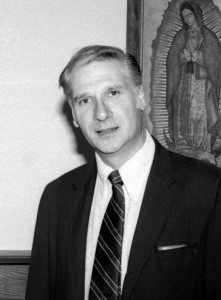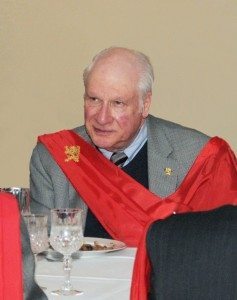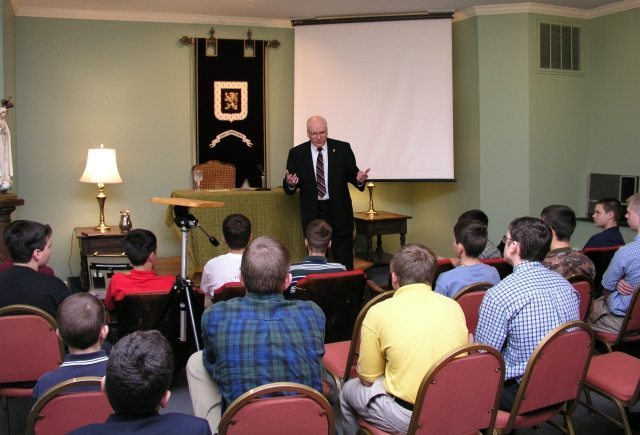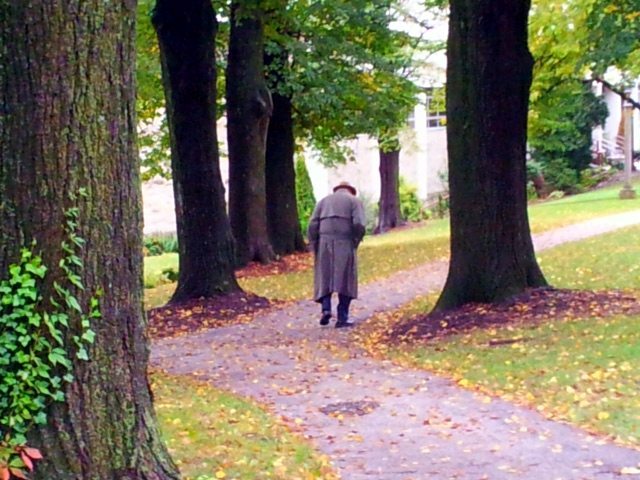 Members of the American TFP mourn the passing of Mr. Jeremiah Wells on January 11, 2016. Anyone who knew him would agree he was a man who lived a life worthy of a book. It is therefore fitting to take at least a glimpse at the colorful life of this atypical Catholic man.
Members of the American TFP mourn the passing of Mr. Jeremiah Wells on January 11, 2016. Anyone who knew him would agree he was a man who lived a life worthy of a book. It is therefore fitting to take at least a glimpse at the colorful life of this atypical Catholic man.
Influence of His Mother
He was born in Boston, Mass. on February 27, 1934, the only child to James and Alvinia (née Charette) Wells. His mother was of French Canadian descent and a devotee of the Blessed Mother. He never spoke much about his youth however, because it was both sad and difficult, which no doubt contributed to his tough spirit. When still quite young his father abandoned the family, refused to pay alimony thus leaving his mother impoverished. She eked out a meager existence as a seamstress. This was barely enough to put food on the table or pay household bills.
“Jerry”, as he was frequently referred to in younger days, was eventually placed in a foster home; partly because of financial constraints but also because of his unruly nature. He recognized his difficult temperament and would frequently tell others the sage and humorous counsel his mother once gave him. “Don’t ever get married Jerry,” she said, “or you will make two people’s lives miserable.”
 Learn All About the Prophecies of Our Lady of Good Success About Our Times
Learn All About the Prophecies of Our Lady of Good Success About Our Times
This did nothing to tarnish his affection for her. If fact he considered her “a redeeming factor in his life.” He described her as his own Saint Monica and she never let him forget she was praying for him daily. After her death he retained her sterling silver rosary and kept it throughout his life as a remembrance of her good example.
His mother visited him occasionally at the foster home, when she could save up enough money. These were no doubt welcome visits since life there was not easy. He characterized the woman in charge of the home in football terms as a “half-back” and “a cruel Protestant.” He tells of being beaten with a razor strap when he was only nine years old and when he was twelve he came down with bronchitis. In the face of what seemed an endless series of hurdles, he describes “giving up on life.” A kind doctor, recognizing this, took Jerry under his wing and encouraged him to keep fighting. It was the much needed fatherly advice he had been denied and it did wonders to lift his spirit.
Boston College High School and the U.S. Merchant Marine
His mother eventually told him that if he “shaped up” she would send him to Boston College High School. When he arrived there, the principal, recognizing his intellectual ability and desire to learn, said, “I will give you a scholarship, all you have to do is show up.” During his time at the renowned preparatory school he excelled in math and literature which would serve him later in life.
His adventurous spirit however led him to join the U.S. Merchant Marine. But this did not last long because of the influence of yet another man who Providence placed in his path. One day he was speaking with the captain and conveyed his love for literature. Perceiving a refinement of soul, even if hidden below a brittle exterior, the ship’s commander was worried that Jerry would be ruined by the bad influence of the other men aboard as they planned to embark on a three-year journey. The captain thus urged him not to go. He took the advice, got off the ship and in his characteristic style hitchhiked from Galveston back to Boston where he got a job as a surveyor.

His work entailed large building projects, highways and tunnels. His colorful ways, witty personality and independent spirit made him a natural born leader. A strong sense of justice led Mr. Wells to speak out on behalf of those receiving low wages for the dangerous work they were doing. This won him no favor among the higher-ups in the industry. He was eventually shut out of jobs and even received death threats. This led him finally to New York where he landed a job doing similar work.
“Do You Believe In the Divinity of Christ?”
Never one to sugarcoat things, he openly admitted being a sinner who liked to drink in his early life. This earned him a reputation among fellow workers which can be observed in a life-and-death experience he had while working on a tunnel below the mountains outside New York City.
While on an excavation site, a massive stone was dislodged, fell to the ground, narrowly missing him. Taking note of Jerry’s brush with eternity the man standing next to him said, “Wells, if that would have hit you, you would have gone straight to hell.” Mr. Wells would tell stories like this, admitting this would have been his destiny if God had decided to take him then.
His co-workers might have seen what appeared but the Lord beholds the heart. This side manifested itself in a striking way during a conversation which he describes as one of the key points in his life.
One night he was going out on the town with what he described as, “a bunch of pagans going out to see a pagan play.” The subject of religion came up and one of the young ladies, named Joan, turned to Mr. Wells and asked, “Jerry, do you still believe in the divinity of Christ?”
“Everyone in the car was waiting in breathless anticipation,” he explained, “for an answer they expected to be cutting, witty and another pleasure for them to enjoy that evening.” His response was anything but humorous and was not what any of them expected. “You know what Joan, I still do believe.” He described it as a bombshell that silenced the occupants of the car.
Providential Attack of Kidney Stones
His career was going fine and he was about to get a promotion. Once again Divine Providence intervened by means of an excruciatingly painful attack of kidney stones. He would need an operation to remove them but, in spite of the pain, he did not allow this to prevent him from enjoying one of the things he truly loved in life, swimming.
The exertion caused the stones to move. One wonders how a man could endure such a painful predicament, most especially his doctors. When it came time for the operation they were nonplussed. Unable to figure out where the stones had gone, a normally minor operation turned into yet another drama in the operatic life of this man.
The Intervention of Our Lady in History
Doctors were forced to make a larger incision in order to remove the stones. This in turn meant weeks of convalescence. He thus missed the opportunity for the position and better pay he desired. Mr. Wells would clearly recall this as an intervention of Our Lady since that promotion would have only increased the worldly allures he felt and taken him farther from his Faith. It was an example of God writing straight even if, at the time, he saw a crooked line.
Like a formerly worldly Saint Ignatius of Loyola who, under similar circumstances, began reading the lives of the saints, Mr. Wells had a similar experience. It was not the lives of the saints which consumed him, but rather history. He read nearly the entire ten-volume set of The Story of Civilization by Will and Ariel Durant and from then on he devoured anything he could get on the story of mankind.

“Had I Gotten That Promotion I Might Never Have Joined the TFP”
He eventually met members of The American Society for the Defense of Tradition, Family and Property (TFP), and was introduced to the writings of Prof. Plinio Corrêa de Oliveira. Mr. Wells’ appreciation and profound admiration for this man increased throughout his life. What most impressed him was Prof. de Oliveira’s seminal work Revolution and Counter-Revolution, and it became for him the clarifying prism that explained historical events that were otherwise obscure.
On many occasions he expressed his disgust with historical revisionists who reshaped world events, past and present, to fit their revolutionary narrative, “taking out what they didn’t like and inserting what they did.”
Recognizing the opportunity to serve Our Lady and the Catholic cause in a meaningful way and the occasion to surround himself with upright men—unlike those he had associated with before—was a chance of a lifetime. He saw in this turn of events an invitation, a calling, and decided to join the TFP in 1977. “If I had not responded in the way I did,” he said, “I would have been lost.” And he saw his time in the hospital as playing a key role. “Had I gotten that promotion,” he explained, “I might never have joined the TFP.”
During his TFP years, he held various positions, including speaker, writer, author and librarian. However, teaching was his passion. He taught classes for high school and college-age students in history, apologetics and religion.
Sedes Sapientiae Institute
Mr. Wells spent the last years of his life teaching young men in the TFP’s Sedes Sapientiae Institute, a three-year college-level course for those considering membership in the organization.
His classes were unique however since he often weaved in humorous, but educational, stories of his life as wise lessons for his students. He did not see history as a collection of disconnected facts, or as events that one could shape to one’s liking as revisionists do, but rather as a continuous collection of events affecting mankind.

Very much like Saint Louis de Montfort, author of the Treatise on True Devotion to the Blessed Virgin, he saw everything as a fight between the seed or offspring of the Virgin and the seed of the serpent, or as Prof. de Oliveira termed it, a fight between the Revolution and the Counter-Revolution. Students of this Institute vividly recalled his last class when he reminded them in his categorical way, that God has infinite sovereignty over us all. “Every morning when I awake,” he told them, “I think about that and you should also. Everything and everyone is in the hands of God.” What more could one ask from a history teacher?
He was not one to just “talk the talk,” he also “walked the walk.” He truly lived his Catholic Faith and in a very refreshing manly way. Those same young students, as did all members of the American TFP, observed his daily routine of walking around the TFP’s headquarters in Spring Grove, Penn. praying his rosary and The Little Office of the Blessed Virgin Mary, which he recited daily. This would serve him well during his last days.
Massive Heart Attack and Last Days
It all began on the evening of Sunday, January 3, at 7:00 PM when Mr. Wells suffered a heart attack that was later described by doctors as a “widow maker.” Severe chest pains were eventually accompanied by numbness in the arm and profuse sweating. He figured that by lying down to rest it would pass. It did not.
At 10:10 PM he fortuitously found a TFP member who rushed him to a nearby hospital in Hanover. They immediately took him to surgery and inserted a stent into the main artery which was completely blocked.
Mr. Wells was awake and alert during the procedure and marveled at the competence of the doctors and nurses, but also reflected on what might have been a life-ending experience. He recalled his past and how, by the grace of Our Lady, he had reformed his wayward life. This in turn evoked a calm disposition and an attitude of conformity to God’s will.
He was later informed that because of the severity of the attack, his heart was damaged and functioning at thirty-five percent capacity. He took this news with total tranquility and was discharged on Thursday morning. On his first day back he allowed others to drive him around the property, but on the following day—in his characteristic Bostonian way—he refused any further assistance. He then got right back into his daily routine of prayers and study in anticipation of his next class for the Sedes Sapientiae Institute.
“Jesus, Mary, Get Me There!”
One of his students recalled seeing him in the foyer reading the newspaper as was his afternoon custom. “How do you feel Mr. Wells?” he asked. Temporarily putting aside the paper he responded, “I feel great!” then quickly added with a scowl on his face, “But the Revolution has made great strides while I have been away.” He then returned to his reading. This comment was but another example of how he saw world events as a grand struggle between the Revolution and the Counter-Revolution as defined by Prof. de Oliveira.

During these last few days numerous TFP members noticed, and commented on, a certain imponderable in Mr. Wells that is hard to put into words. He was like a man who realized he had “dodged a bullet” but that his time might be coming to an end. This did not lead him to a sentimental attitude nor did he show the slightest fear. Rather, he seemed to have a praiseworthy resignation to Our Lady’s will and a resolve to continue serving Her with the educational talents She had given him.
On the following Monday, when he was not seen walking the property, reciting his daily prayers, everyone knew something was wrong. He was found in his room as if peacefully sleeping, but it was clear his earthly life’s journey had come to an end. From all indications he had died in his sleep. Reflecting on the way he passed seems yet another mercy on the part of Our Lady for a man who had a hard life. His work was done.
* * *
This narration should not be seen as hagiography. Mr. Wells himself would not want to be seen as a saint, but rather as a sinner who strove with all his might not to give in to his bad inclinations. Like the prodigal son, he had tasted the bitterness of the “husks of swine” and never wanted to return to the putrid trough of sin. In fact he was once quoted as saying how he was bound and determined “never to commit another mortal sin as long as I live.” While he continued to be, until his last day, a no-nonsense, straight-talking type of man, anyone that had the privilege to know him could not fail to see the heart of gold beneath his crusty exterior.
To his fellow TFP members, and students, he will be remembered as a man, who was outspoken in his views, a fierce defender of the Catholic Faith and of Christian civilization, a scholar and a gentleman of strong character.
He will be sorely missed by the hundreds of students and young people who have benefited from his classes, and those whose lives he touched in a profound way. But, it must be strenuously added, he would want those who knew him to pray for his eternal rest.

